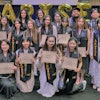 From left to right, Mr. Michael Wang, Dr.Chunyan Li, Congressman Dana Rohrabacher and Mr. Yukong Zhang, Dr. Ajay Kothari
From left to right, Mr. Michael Wang, Dr.Chunyan Li, Congressman Dana Rohrabacher and Mr. Yukong Zhang, Dr. Ajay Kothari
At a press conference held Friday afternoon, coalition leaders said that holistic, race-based admissions policies hold Asian American students to higher standards than all other racial or ethnic groups. They called on Ivy League schools to eliminate the consideration of race in admissions decisions. In addition, the coalition said that Harvard University has an unlawful quota for the number of Asian American students it will admit.
Michael Wang, an Asian American student currently enrolled at Williams College, said at the press conference that he was denied admittance to Harvard and other Ivy League schools due to his race, despite his excellent academic and extracurricular qualifications.
“When our admissions offices set these standards and quotas, we don’t feel proud of being Asian anymore, and that’s not correct. See, all races should be equal to each other,” Wang said, adding that he filed complaints against Princeton, Yale, and Stanford but did not get the results he sought.
At the press conference, coalition leaders stated that Asian Americans have suffered the most due to Harvard’s holistic admissions policies, followed by White students, while some Blacks and Hispanics have received preferential treatment.
Among the various critiques of race-based admissions posed at the press conference, coalition leaders argued that affirmative action policies do not actually benefit the intended targets of such policies—low-income, minority students. Coalition leaders said that, instead, affirmative action policies created a “privileged class” of middle-class Blacks and Hispanics in college admissions.
“[Ivy League universities] achieve racial diversity by getting international students from Africa, from middle-class African [American] and Latino communities. It’s not really addressing the real issue of poverty in secondary education,” said Dr. Chunyan Li, the event host. “So I thought our effort is not just for Asian Americans; it should be asking the entire country to look into how we address the real issues in secondary education.”














